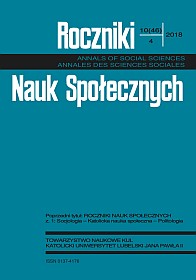Quantitative and Qualitative Research in Sociology. Between the Epistemological Separation and the Practical Complementarity
Abstract
Quantitative and qualitative research are based on different epistemological foundations which refers to different vision of social reality. The attachment to research rules rooted in a given epistemology is a methodological virtue but makes the research practice more difficult. Perhaps this is the main cause of general calling for coexistence and complementarity of quantitative and qualitative methodologies and research approaches, as well as of the thesis that they are applying to different aspects to social reality. In particular the rapid development and increasing complexity of both quantitative and qualitative methodologies stimulate such complementarity, regardless of epistemological perspectives.
In the article some dilemmas related to the duality of these perspectives and the differentiation of methodologies, methods and techniques of sociological research.
References
Bone J., Emele C.D., Abdul A. [et al.], The social sciences and the web: From ‘Lurking’ to interdisciplinary ‘Big Data’ research, http://journals.sagepub/doi/full/10.1177/2059799116630665 [dostęp: 26.10.2017].
Bunge M.A., Finding Philosophy in Social Sciences, New Heaven: Yale University Press 1996.
Charmaz K., Grounded theory: constructivist and objectivist methods, w: Handbook of Qualitative Research, red. N.K. Denzin, Y.S. Lincoln, Thousand Oaks: Sage 2000.
Charmaz K., Grounded Theory: Methodology and Theory Construction, w: International Encyclopedia of Social & Behavioral Sciences, red. N.J. Smelser, P.B. Baltes, Oxford: Pergamon Press 2001.
Cicourel A.V., Method and measurement in sociology, New York: Free Press 1964.
Cornwall J., Hard-earned lives: accounts of health and illness from East London, London: Tavistock 1987.
Emma Uprichard: Big Data and ‘Methodological Genocide’, interview by Marc Carrigan, http://www.methodspace.com/tag/emma-uprichard/ [dostęp: 20.10.2017].
Glaser B., Strauss A., Odkrywanie teorii ugruntowanej. Strategie badania jakościowego, Kraków: Zakład Wydawniczy NOMOS 2009.
Golczyńska-Grondas A., Wychowało nas państwo. Rzecz o tożsamości dorosłych wychowanków placówek opiekuńczo-wychowawczych, Łódź: Wydawnictwo Uniwersytetu Łódzkiego 2013.
Gostkowski Z., Z zagadnień socjologii wywiadu, „Studia Socjologiczne” 1961, nr 2.
https://50latodkrywania.wordpress.com/ [dostęp: 13.10.2017].
Krausz E., Miller S.H., Social research design, London: Longman Group Ltd 1974.
Morgan M., Sociological investigations, w: Oxford Textbook of Public Health, red. W.W. Holland, R. Detels, G. Knox, Oxford: Oxford University Press 1991.
Pałubicka A., Naturalizm i antynaturalizm, w: Filozofia i nauka, red. Z. Cackowski, Wrocław–Warszawa–Kraków–Gdańsk–Łódź: Ossolineum 1987.
Puchalski K., Korzeniowska E., Piwowarska-Pościk L., Aktywność zdrowotna i świadomość potoczna, Łódź: Oficyna Wydawnicza Instytutu Medycyny Pracy 1999.
Słomczyński K.M., Wpływ oficjalnej i prywatnej sytuacji wywiadu na wypowiedzi respondentów w środowisku inteligencji, w: Analizy i próby technik badawczych w socjologii, red. Z. Gostkowski, Wrocław–Warszawa–Kraków: Ossolineum 1966.
Szacki J., Historia myśli socjologicznej, Warszawa: Wydawnictwo Naukowe PWN 2005.
Turner C., Martin E., Background (introductory chapter), w: Surveying Subjective Phenomena, red. C. Turner, E. Martin, New York: Russell Sage Foundation 1984.
Wilson E.O., Konsiliencja. Jedność wiedzy, Poznań: Zysk i S-ka 2002.
Copyright (c) 2018 Roczniki Nauk Społecznych

This work is licensed under a Creative Commons Attribution-NonCommercial-NoDerivatives 4.0 International License.


